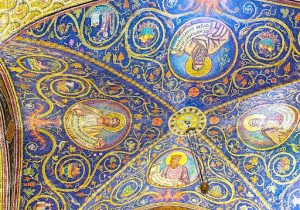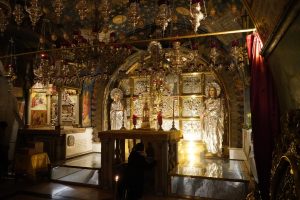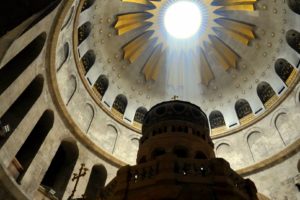Psalm 22: A Prophetic Echo from the Cross
The Gospels record Jesus’ words in Greek, the common language of the region, though he primarily spoke Aramaic. However, there are rare exceptions, and the most striking is this phrase from the cross: “‘Eloi, Eloi, lema sabachthani?’ (which translates to: ‘My God, my God, why have you forsaken me?’)” (Mark 15:34 and Matthew 27:46). Why did the evangelists choose to preserve this phrase in its original language? It is because it marks the opening or title of Psalm 22. The evangelists wanted readers to recognize it, so they would understand that Jesus was pointing to the prophecy being fulfilled in what was unfolding.

Chapel of the Holy Sepulcher, Jerusalem
Psalm 22, likely written by David some 1,000 years before Christ, seems to anticipate—in a sort of “firsthand” experience—what Jesus would endure. This is evident in several passages:
-The psalm begins with the words: “My God, my God, why have you abandoned me?”, which are the very words Jesus spoke from the cross, as recorded in Matthew 27:46 and Mark 15:34.
-By quoting the psalm, Jesus suggests that everything happening aligns with its prophecy. For instance, when: “The chief priests, with the scribes, mocked him among themselves and said, ‘He saved others; he cannot save himself” (Mark 15:31) and also “He trusted in God; let him deliver him now if he loves him” (Matthew 27:43), the psalm echoes: “He trusted in God; let him deliver him now if he loves him” (Psalm 22, 8-9), and also: “They gloat over me” (v.18).

Calvary, Jerusalem
The psalm foretold the crucifixion, stating: “They have pierced my hands and my feet” (v.17). This is confirmed in John 20:25: “Unless I see the mark of the nails in his hands and put my finger into the nailmarks and put my hand into his side, I will not believe”.
It even predicted what the soldiers would do: “They divide my garments among them; for my clothing they cast lots” (v.19), an event fulfilled at the crucifixion, as recorded in Matthew 27:35, Mark 15:24, Luke 23:34, and John 19:23-24.
We know that during crucifixion, executioners forcibly dislocated the arms’ bones to keep them outstretched; additionally, the heart gradually lost strength, unable to sustain the body; and blood loss caused intense thirst. Remarkably, the psalm captures all this: “I am poured out like water; my bones are disjointed; my heart has become like wax, it melts away within me. My throat is dried up like baked clay, my tongue cleaves to my jaws; you lay me in the dust of death” (vs.15-16). And lastly, they broke the legs of the two thieves, but Jesus was already dead, fulfilling the psalm once more: “I can count all my bones” (Sal 21(22), 18).

Fourteenth Station Jesus is laid in the tomb, photo by Silvany
Finally, despite the suffering and anguish described, the psalmist expresses trust in the salvation that will come from God (verses 20-22). This trust mirrors Jesus’ confidence in God the Father, even amid his suffering, as seen in Luke 23:46: “Father, into your hands I commend my spirit.”
By father Rafael Sanz, priest
